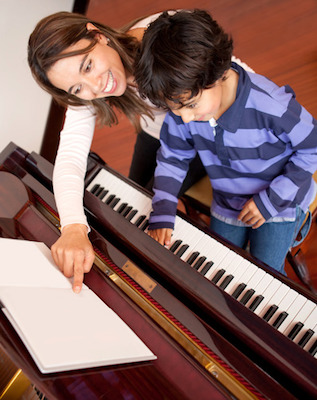Have you ever heard a child pick up and play the trumpet for the very first time?
The noise that comes from within would never be described as music.
Or how about a violin? One pull of the bow across the strings will leave you with raised eyebrows and shaking your head, willing the sound to go away.
Have a child pick up a guitar and ask them to play a certain note again and again. You’ll be lucky if you can tell they were anywhere near the same range.
Most instruments take a fair amount of talent to make them sound like they’re supposed to. It takes time to learn to hold your mouth just so. Or to place your fingers on the strings. Or to move your hands the way you do. 
That’s not the case with a piano. No matter how novice you are at playing, anyone can sit down and touch a key and produce the note as it was intended to be played. If you touch middle C, it will sound just like anyone else who touches the same note.
If a piano has been tuned, striking the key will create the perfect tone. You can tap it or punch it hard and the true tone of the note will ring through.
Try that with a trumpet or violin.
But just because it’s easier to create the right notes, doesn’t make the piano that much easier to play. In fact, many would argue that the piano is the most difficult instrument to master.
Learning any instrument takes a certain amount of time to master the basic skills. A guitarist will have to memorize and execute chords. A trumpet player will have to learn both fingering techniques, and the different ways notes are created with the mouth. Even a drummer has to learn to use both hands in a variety of ways to create a multitude of different sounds.
But a piano takes learning to another level. It requires both hands navigating up and down the keyboard, having the option of touching and combining 88 keys at any given time to create sounds. The hands must work together to create music. And for most people, that’s something they’ve never had to master before. Most of us are born favoring one hand over the other. With the piano, you have to put everything into making them work together. And to do so requires brain work you’ve never had to use in any other way. It takes a lifetime to master.
Yet from the moment you sit down for the very first time, touching a note gives you a sense of wonder. With a little playing, you can pick out a tune. With a little coaching, you can play a recognizable melody.
And that’s where it all begins.


